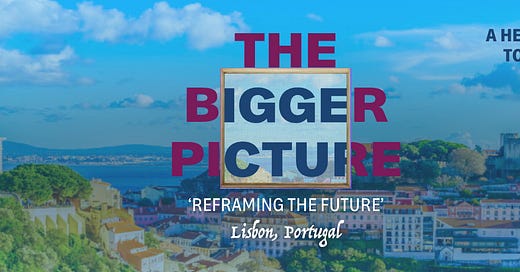Beyond the Anglosphere: The Bigger Picture Conference in Lisbon
Reckoning with Trans Ideology in Europe
On September 27-29th scientists, researchers, legal professionals, medical practitioners, psychologists, sociologists, educators, feminists, and detransitioners from around the world will gather in Lisbon, Portugal for Genspect’s The Bigger Picture Conference. The location, which for the first time is beyond the Anglosphere, was chosen as part of Genspect’s ongoing counter-conference campaign which aims to provide an alternative to the WPATH (World Professional Association for Transgender Health) conference taking place simultaneously.
While controversy over trans ideology rages in English-speaking countries, where the lessons learned in one country instantly inform the debate across them all. outside of the Anglophone world, the language barrier seems to keep many of these debates out of the public eye.
So, while Portugal, as Maria Antunes writes in Inspecting Gender, has not been immune to the influence of trans ideology, it is still staggering to see how policies that have been wildly controversial in the Anglosphere have been adopted as a matter of course. A small sample includes:
“A National Strategy for Equality and Non-Discrimination 2018-2030, which includes—for the first time in the country—a specific Action Plan to Combat Discrimination on the Grounds of Sexual Orientation, Gender Identity and Expression, and Sex Characteristics”.
An “Action Plan” to combat discrimination on the grounds of sexual orientation, gender identity and expression, and sex characteristics. (The plan, which is renewed every 4 years, will promote the mainstreaming of policies based around LGBTQI needs and protection from discrimination both in public and private life).
The elimination of the requirement for a medical diagnosis for legal gender recognition.
A guarantee that trans people will have access to specialized health services within the health care system.
Measures to “prevent discrimination in schools, including teachers’ training and complaint mechanisms”.
Allowing minors as young as 16 to change gender markers in legal documents with the permission of their parents or guardians.
The requirement that trans persons of any age to be officially identified by their adopted name “regardless of any change in legal documents”.
How did this happen? Curious to understand what ordinary Portuguese think, I reached out to a few.
Rui, a friend of a friend, told me that he thinks most people he knows associate transition with figures such as Marina Machete Reis, the transwoman crowned Miss Universe Portugal 2023. He only became aware that it was more widespread when a friend’s teenage daughter began medical transition. Susana, an academic, told me that she thinks most people regard sex change as a “bizarre situation” or a fad that has something to do with LGB rights.
For instance, she tells me that “gender identity’ is often assumed to mean “homosexual.” When I asked about the use of preferred or novel pronouns in the Portuguese language, she explained that, although it is possible, it is difficult. “Only the youngest,” she says, make the effort.
None of the people I spoke with had ever encountered a Portuguese equivalent to terms such as AFAB (assigned female at birth) or AMAB (assigned male at birth) or other “inclusive” language such as “birthing parent” or “chest feeding”, controversies around biological men in women’s prisons or on Lesbian dating apps? Not that they were aware of.
This “snapshot” of a handful of people is not scientific, but it is interesting. Our conversation was reminiscent of attitudes in Britain and the US around 2015. In those days most people took a live-and-let-live attitude to gender transition, blissfully unaware of preferred pronouns, queer theory, or trans ideology in schools. The English-speaking world is having its own reckoning with the stealth installment of policies based on trans ideology. The difference in Portugal is that it appears that the most controversial measures such as self-ID and the ban on so-called conversion therapy (really a ban on exploratory therapy) are already a fait accompli.
Understanding how trans ideology is spreading across Europe, capturing institutions, and acculturating the youngest generation are some of the themes we will be exploring at The Bigger Picture Conference (see the full program here).
We hope you will join us to help us understand the European situation as never before. Some of our European Speakers include:
Eldur Smári Kristinsson
Freelance Writer and chairman of the Lesbian and Gay Alliance in Iceland on the Dangers of Self-Id
Frank Furedi
Author and Social Commentator on The EU and Its Obsessive Policy of Gender Mainstreaming and Gender Conditionality
Jesper Rasmussen
Writer, Producer and Educator on Raising Political Swords: How Denmark Is Fighting Child Sex Change
Mattias Desmet
Clinical Psychologist on The Act of Truth Speech in Times of Propaganda and Artificial Intelligence
Tove Solander
Researcher and Author on Analysis from a Swedish Study on Detransition
Jaco van Zyl
Clinical Psychologist and Psychoanalytic Psychotherapist on Critical Therapy Antidote: 'The Psychological Drive to Transition'
Dr. Sven Román
Psychiatrist on Enforcing the Right to Freedom of Speech, Research and Education in Mental Health Issues and Overcoming Gender Identity Challenges Through Scientific-Based Research, Treatments, and Education






Interesting to see a wider choice of views and (not yet) any heavy thought policing .
I did say 'not yet' ! Meaning only that 'potential' is not as far along the road to enforced lunacy as we are !